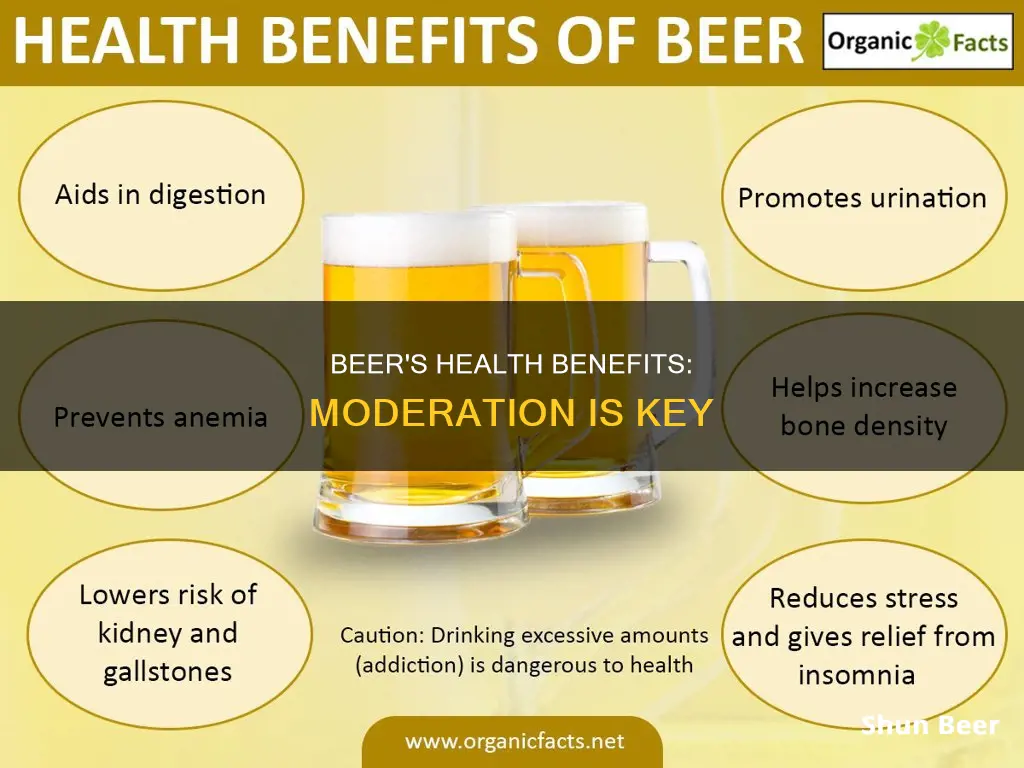
Beer is one of the oldest beverages in the world, and it's no wonder that some people believe it has health benefits. While science supports some of these claims, beer also has drawbacks. Moderate drinking (no more than one drink per day for women and two drinks per day for men) may be good for the heart and circulatory system and may protect against type 2 diabetes and gallstones. However, heavy drinking can cause liver disease, certain cancers, heart disease, weight gain, sleep problems, and other serious health issues. The health effects of drinking beer are mixed, and it's important to be mindful of how much you're consuming.
| Characteristics | Values |
|---|---|
| Nutrients | Vitamins B1, B2, B3, B5, B12, phosphorus, folate, niacin, silicon, fibre, protein, antioxidants |
| Lower risk of | Heart disease, osteoporosis, diabetes, Alzheimer's, dementia, type 2 diabetes, cardiovascular disease |
| Increased risk of | Addiction, reduced life expectancy, liver disease, weight gain, cancers (mouth, throat, breast, liver, colon, rectum), depression, death |
| Calories | 153 calories per 12-ounce beer |
| Alcohol content | 4–6% alcohol, but can range from 0.5–40% |
What You'll Learn

Beer may reduce the risk of heart disease
Beer has been consumed by humans for thousands of years, and while it has a reputation for contributing to weight gain and other health issues, it may also have some surprising health benefits when consumed in moderation.
Several studies have found that drinking beer in moderation may lower your risk of heart disease. A 2016 review article found that low to moderate beer consumption, defined as up to one drink per day for women and up to two drinks per day for men, decreased the risk of cardiovascular disease. Another study showed that one drink a day lowered the risk of all-cause mortality for women, and up to two drinks a day produced the same results for men.
Beer may be as effective at improving general heart health as wine at comparable alcohol levels. This is because moderate amounts of alcohol raise levels of high-density lipoprotein (HDL), or "good" cholesterol, and higher HDL levels are associated with greater protection against heart disease.
Research also shows that of men who have already suffered a heart attack, those who drank beer moderately were 42% less likely to die of heart disease.
Beer vs Diet Coke: Which is Healthier?
You may want to see also

Beer may improve blood sugar control
Beer has a long history in human culture, and it's no surprise that it has been the subject of health research. While beer has its drawbacks, it may offer certain health benefits when consumed in moderation. One potential benefit is its positive impact on blood sugar control, which can be particularly relevant for people with diabetes.
Beer contains carbohydrates that are quickly absorbed into the bloodstream, leading to increased glucose levels. However, excessive alcohol consumption can interfere with blood sugar regulation and disrupt glucose production in the liver, resulting in low blood sugar or hypoglycemia. This effect is more pronounced for those with type 1 diabetes and those with type 2 diabetes using insulin. Therefore, moderation is crucial when it comes to drinking beer for blood sugar control.
Several studies have found a link between light to moderate alcohol consumption and improved blood sugar levels. A 2018 study concluded that low to moderate alcohol intake was associated with better blood sugar levels and a reduced risk of developing type 2 diabetes. Additionally, a 2019 study found that postmenopausal women who drank beer 2-3 times per week had higher bone density and a potentially lower risk of osteoporosis.
The type of beer consumed also plays a role. Low-sugar beers, such as light beers, are more effective in controlling blood sugar levels. These beers have a lower alcohol content and fewer calories, which can help manage weight and reduce the risk of weight-related complications.
It is important to note that while beer may have a positive impact on blood sugar control for some, it is not a substitute for a healthy lifestyle. Maintaining a balanced diet rich in fruits, vegetables, whole grains, and lean proteins, along with regular exercise, is crucial for overall health. Additionally, individuals with diabetes should consult their healthcare providers before consuming alcohol, as it can interfere with diabetes medications and carry certain risks.
Beer, Tomato Juice: Healthy Combo or Not?
You may want to see also

Beer may aid bone density
Beer may be good for bone density, but only when consumed in moderation. Drinking more than two beers a day can negate any potential health benefits.
Several studies have found that light to moderate alcohol intake may be linked to stronger bones in men and postmenopausal women. This may be because alcohol, in moderate amounts, can help bones. However, this benefit sharply drops when consumption passes two drinks a day, so moderation is key.
Beer is one of the few significant dietary sources of silicon, which research shows can help prevent osteoporosis. A review published in the International Journal of Endocrinology found that moderate beer consumption increased bone density in men. No, it's not the buzz that's helping those bones grow; it may be the silicon found in your pint, which is an essential mineral for bone formation.
While beer may be good for bone density in moderation, excessive consumption can lead to conditions such as cancer, liver disease, and cardiovascular disease.
Mead vs Beer: Which Is Healthier?
You may want to see also

Beer may lower dementia risk
Dementia is a growing health issue worldwide, and as there is currently no cure, prevention is critical. While excessive alcohol consumption is a well-known risk factor for dementia, light to moderate alcohol consumption has been found to have the opposite effect, reducing the risk of developing neurodegenerative diseases such as Alzheimer's disease.
Several studies have shown that drinking beer in moderation can lower the risk of dementia. For example, a study by researchers at Loyola University in Chicago found that moderate beer drinkers were 23% less likely to develop Alzheimer's and dementia than non-beer drinkers. Another study of 80,000 participants, presented at the American Heart Association Scientific Sessions 2016, found that moderate drinkers had the slowest decline in high-density lipoprotein (HDL) or "good" cholesterol levels, which is associated with a lower risk of cardiovascular diseases and improved blood flow to the brain.
The silicon found in beer is an essential mineral for bone formation and may also play a role in protecting the brain. Beer is also a source of B vitamins, which are important for maintaining brain health.
However, it is important to note that excessive alcohol consumption can lead to negative health consequences, including an increased risk of dementia. Therefore, drinking in moderation is key to potentially achieving the health benefits associated with beer consumption.
Hard Seltzer vs Beer: Which Drink is Healthier?
You may want to see also

Beer may reduce the risk of diabetes
Several studies have found a link between moderate beer consumption and a reduced risk of developing diabetes. One study published in the journal of the European Association for the Study of Diabetes found that people who drank 3 to 4 times per week were less likely to develop diabetes than those who never drank. Another study showed that men who drank between one and six beers per week had a 21% lower risk of diabetes compared to those who didn't drink beer. Additionally, a 2018 study concluded that low to moderate alcohol consumption was associated with better blood sugar control and a reduced risk of developing type 2 diabetes.
The positive effects of beer on diabetes risk may be due to its impact on blood sugar levels. Drinking light amounts of alcohol may help reduce the risk of developing diabetes and help people with diabetes manage their blood sugar more effectively. However, it is important to note that the type of beer consumed matters. Low-sugar beers, such as light beers, are more effective in lowering the risk of diabetes.
While beer may have potential benefits in reducing the risk of diabetes, it is important to consume it in moderation. Excessive alcohol consumption can lead to negative health consequences, including an increased risk of cardiovascular disease, liver disease, and neuropsychiatric diseases. Additionally, heavy drinking can eliminate the health benefits of beer and increase the risk of addiction and reduced life expectancy. Therefore, it is crucial to drink responsibly and not exceed the recommended daily limits to maintain overall health and well-being.
Champagne vs Beer: Which is the Healthier Drink?
You may want to see also







